

Life insurance policies commonly come with a waiting period, often referred to as the "contestability period." During this timeframe, typically the first two years of the policy, the insurer retains the right to investigate and potentially deny a claim based on misrepresentation or non-disclosure of crucial information during the application process. This waiting period is designed to protect the insurance company against fraud and ensure that policyholders provide accurate and truthful information when applying for coverage. It's crucial for individuals seeking life insurance to understand the specific waiting period associated with their policy, as it can vary between insurance providers and policies.
While waiting periods are a standard practice, not all life insurance policies have them, especially in the case of group life insurance offered by employers. Group life insurance often provides immediate coverage without a waiting period, making it a valuable benefit for employees. It's essential for individuals to carefully review the terms and conditions of their life insurance policy to determine if there is a waiting period, how long it lasts, and any conditions that may affect its applicability. Being informed about the waiting period ensures that policyholders have a clear understanding of when their coverage will take effect and how it may impact their ability to make claims in the initial years of the policy.
No waiting period life insurance is a unique type of coverage that provides immediate benefits without the typical waiting period associated with traditional policies. This means that from the moment the policy goes into effect, policyholders can access the full benefits without having to endure a waiting period commonly seen in other life insurance plans. This type of insurance is particularly appealing for individuals who require quick and uncomplicated coverage, offering peace of mind to beneficiaries without the delay often associated with waiting periods.
No waiting period life insurance policies are designed to meet the urgent needs of individuals seeking immediate financial protection for their loved ones. These policies are especially advantageous for those who may have pre-existing health conditions or concerns about the potential waiting period associated with traditional life insurance. With no waiting period, policyholders can rest assured that their beneficiaries will receive the intended financial support without the delay that waiting periods might impose in other life insurance options.
The presence of a waiting period in life insurance for seniors varies depending on the type of policy and the insurance provider. While many life insurance policies for seniors do have waiting periods, particularly those associated with burial or final expense insurance, there are also options available that offer immediate coverage. Burial insurance, often marketed towards seniors, may come with a waiting period, typically ranging from a few months to a couple of years. During this waiting period, if the insured passes away, the policy may only pay out a limited benefit or a return of premiums paid. It's crucial for seniors and their families to carefully review policy terms to understand the waiting period and its implications.
Some life insurance options for seniors, like guaranteed issue or simplified issue policies, may provide coverage without a waiting period. Guaranteed issue policies, in particular, are designed for seniors who may have difficulty obtaining coverage elsewhere due to health issues. These policies usually have higher premiums but offer immediate coverage without the need for a medical exam or health questionnaire. Seniors considering life insurance should carefully compare different policies, taking into account waiting periods, coverage amounts, and overall costs to find the best option that meets their specific needs and circumstances.


If an individual passes away shortly after obtaining life insurance, generally within the first month, the insurance policy is still expected to provide coverage. Life insurance policies typically go into effect as soon as the underwriting process is complete, and the policyholder has paid the initial premium. In the unfortunate event of the policyholder's death during this early stage, the designated beneficiaries should be entitled to receive the death benefit outlined in the policy. However, it's crucial for policyholders and their beneficiaries to thoroughly review the terms and conditions of the policy to ensure that there are no specific exclusions or waiting periods that may impact the payout.
It's worth noting that some insurance policies may include a contestability period, usually within the first two years of the policy's inception. During this period, the insurance company has the right to investigate and potentially deny a claim based on misrepresentation or non-disclosure of information during the application process. While this period is designed to prevent fraud, if the policyholder's passing is unrelated to any misrepresented information, the death benefit should still be paid out to the beneficiaries. It is essential for policyholders and their loved ones to be aware of the policy details and promptly inform the insurance company of a claim in the event of the policyholder's death.
The duration one should have life insurance before passing away is subjective and dependent on individual circumstances. Life insurance is designed to provide financial protection for beneficiaries in the event of the policyholder's death, and coverage typically begins as soon as the policy is in effect. There is no specific timeframe one must hold life insurance before it becomes valid in paying out a death benefit. However, it's essential to secure life insurance well in advance of any potential health issues or life-threatening conditions, as obtaining coverage may become more challenging and expensive as one gets older or faces health complications.
While there isn't a set period one must have life insurance before passing away, experts often recommend obtaining coverage as early as possible to ensure more affordable premiums and broader options. Younger, healthier individuals often qualify for lower premiums, and having life insurance in place early provides longer-term financial protection. Ultimately, the decision on when to get life insurance depends on individual circumstances, such as financial responsibilities, dependents, and overall health. It's advisable to review and update life insurance coverage periodically to ensure it aligns with evolving needs and circumstances throughout one's lifetime.

Unlike some other insurance types, term life insurance typically does not have a waiting period. Term life insurance is designed to provide coverage for a specified period, known as the term, which can range from 10 to 30 years. Once the policy is in effect, the coverage is immediate, and if the policyholder passes away during the term, the death benefit is paid out to the beneficiaries. This absence of a waiting period makes term life insurance an attractive option for individuals seeking straightforward and immediate protection for their loved ones without the complexities often associated with waiting periods.
Term life insurance is known for its simplicity and cost-effectiveness, making it a popular choice for those looking to secure coverage during specific life stages or financial obligations. The absence of a waiting period means that policyholders can have peace of mind knowing that their beneficiaries will receive the full death benefit from the outset of the policy. It's important for individuals considering term life insurance to carefully review the policy terms and conditions, including the length of the term, coverage amounts, and any renewal options, to ensure that the chosen policy aligns with their unique needs and circumstances.
The concept of a death benefit waiting period is not typically associated with traditional life insurance policies. In most standard life insurance policies, including term life and whole life insurance, the death benefit is payable immediately upon the death of the insured, assuming all policy premiums have been paid and the policy is in force. These policies are designed to provide timely financial support to the beneficiaries without the imposition of a waiting period. It is crucial for policyholders to thoroughly review their insurance contracts to understand the specific terms and conditions related to the death benefit, as certain policies may have specific exclusions or limitations.
However, it's important to note that certain insurance products, such as accidental death insurance or graded death benefit policies, might incorporate waiting periods or restrictions. Accidental death insurance may specify a waiting period for coverage to take effect in the case of accidental death, and graded death benefit policies might have a waiting period or tiered structure before the full death benefit is payable. Individuals considering such policies should carefully read and comprehend the terms outlined in the policy documents to understand any waiting periods associated with the death benefit. Always consulting with the insurance provider or agent can provide clarity on specific policy details and waiting periods.

Explore options and conditions under which waiting periods may be modified, waived, or shortened, and understand how this may impact your coverage.
Understand the duration you may need to wait before your beneficiaries can access the benefits in the event of a claim, and any conditions that may affect the payout.